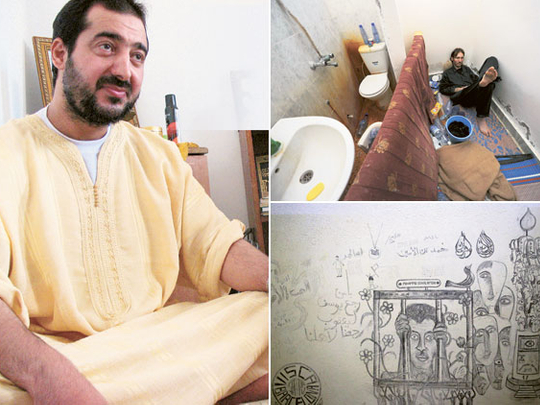
Tripoli: When Said Abdullah arrived in Libya's notorious Abu Salim prison in 1996, he said he was "welcomed with blows and torture" for membership in an Islamist group.
He was held in a small cell with 12 others, no mattresses and one squat toilet they had to unblock with their hands.
In 2006, he was sentenced to death for membership in the Libyan Islamic Fighting Group, an Islamist organisation that plotted to assassinate longtime Libyan leader Muammar Gaddafi. He was put in solitary confinement for a year and a half. At one point, he didn't see the sun for three months and his daily meal was sometimes nothing more than a piece of bread.
Fifteen years on, he thought he would die behind bars.
Then without warning last week, something unimaginable happened: Neighbours stormed the Tripoli lockup and used rocks and metal bars to smash the locks off cell doors. Abdullah and thousands of other inmates were suddenly free in a city that was being upturned by a takeover by revolutionaries.
At first, Abdullah was confused when he heard pounding on his cell door on August 24.
"Where were the warden and the guards? And who are these people with the weapons?" he wondered. Then his cell door swung open. All at once, he realised he was free and hitchhiked home to his family's farm on the outskirts of Tripoli.
"I saw that the whole street was full of revolutionary flags and heard lots of gunfire," he said, smiling widely as he recalled the scene. "But everyone was greeting us and saying, ‘Those are prisoners from Abu Salim!'"
Dark chapter
The regime's loss of control over Abu Salim —where for decades Gaddafi had locked up and tortured opponents, or made them disappear — ended a dark chapter in the country's history and was a stark illustration of how quickly the regime collapsed.
The liberation of the prison also closed a circle. The first demonstrations of Libya's uprising in mid-February demanded the release of a lawyer who represented families of prisoners killed in a 1996 massacre inside Abu Salim.
When the uprising broke out in February, Abdullah was sharing a five-by-six yard cell with four others, one of whom had gone insane from the treatment inside, he said. The group had satellite TV and avidly followed the news. But after about a month, as the uprising evolved into an armed rebellion, the guards abruptly cut the cable.
Later, when inmates heard gunfire outside, the guards called it fireworks.
On August 20, four days before they were liberated, Nato bombed a prison administration building, Abdullah said, and the inmates stopped getting food, indicating the staff had fled.
The prison break came as an invading revolutionaries were sweeping Gaddafi's 42-year-old regime from the capital. At that moment, revolutionaries were fighting fierce battles with Gaddafi loyalists holed up nearby in residential buildings of the Abu Salim neighbourhood.
People living near the prison heard the guards had left and a small group went in. They found only a few guards, who quickly fled, and started forcing open the cells. Crowds from the neighbourhood came to help.
On some prison walls, they found elaborate pencil drawings. One carried the phrase: "The End of the Dark Age." It was dated during the uprising. "This is the prison that created terror in Libya," said Mohammad Al Burki, 32, whose brother Abdul Hakim was among 1,200 prisoners killed in the massacre — the government's response to a prison riot. "This place is a tragedy for all the Libyan people."
Documents
Al Burki spoke inside the prison's looming walls, where he sifted through documents searching for clues to his brother's grave. Piles of flour sacks stuffed with files reached the ceiling in a nearby room. At least two more rooms were similarly jammed with paperwork.
Libyan security arrested Abdul Hakim in 1989, Al Burki said, at a time when Islamist groups were trying to overthrow Gaddafi. His government responded with sweeping crackdowns. Al Burki said his brother was not an Islamist, but prayed regularly, which raised suspicions.
If Abdul Hakim was tried, his family never heard. Prison visits were not allowed.
Then came the massacre. News of the killings were slow to emerge, and it was more than a decade before the government began informing families that their relatives had died. Al Burki's family didn't learn of their brother's death until 2007, he said — even though they'd been bringing food and clothes to the prison for him for years.











